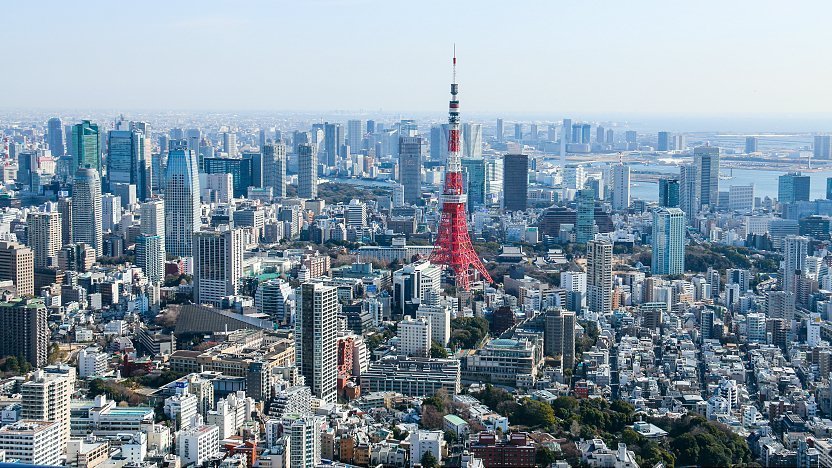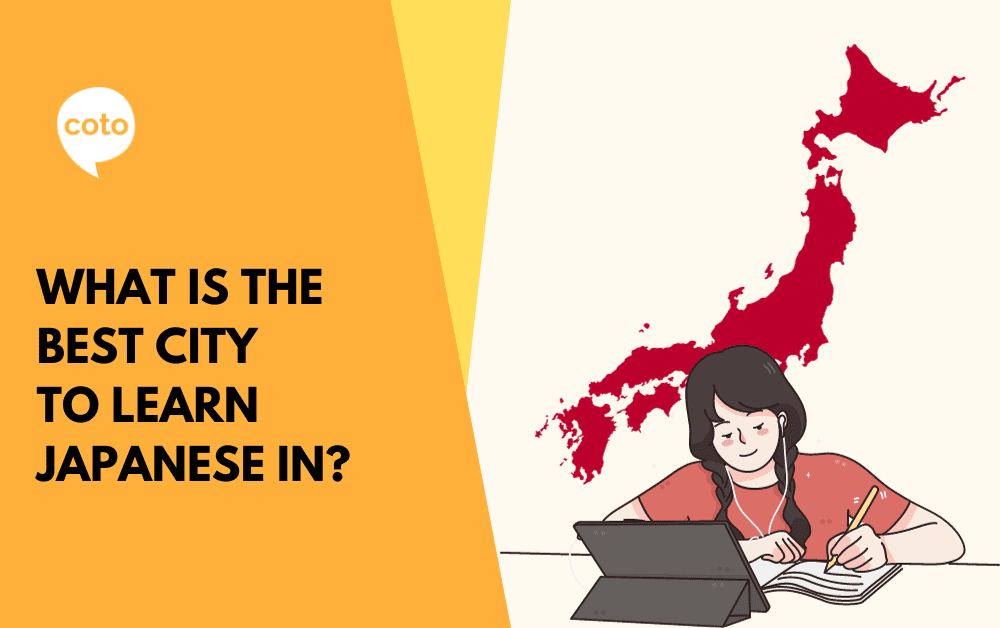Want to learn Japanese? Discover your ideal city with this guide! Explore Tokyo’s education revolution, Osaka’s dialectic differences, Kyoto’s scholarly heritage, and Fukuoka’s student sanctuary. Read on to find the best city for your language journey!
A Quick Jump To…
- Tokyo: The Definitive Language Learning Hub
- Osaka: Intermediate Level’s Gateway to Conversational Mastery
- Kyoto: For the Culturally Immersed Intermediate and Advanced
- Fukuoka: For The Internationals
- FAQ
Tokyo: The Definitive Language Learning Hub
Tokyo’s vast language learning opportunities cater to everyone from complete beginners to advanced speakers. It’s an ideal choice for learners seeking a comprehensive, flexible, and culturally rich educational experience in a global setting. Let’s go through the reasons Tokyo is the best city to learn Japanese in.

Student-Centric Teaching Culture
The teaching style in Tokyo is refreshingly student-centric, focusing on uplifting and supporting learners – a stark contrast to the theory-heavy methods typical in Japanese education. Teachers use research strategies to help learners get more done in less time. However, if you want a more traditional Japanese learning experience, check out Kyoto further down the list.
Best Facilities, Flexible Programs
Tokyo language schools offer the best programs in Japan at reasonable prices. Expect flexible class hours, modular courses, and cutting-edge teaching methods, all within a learner-friendly environment. Students are empowered to reach their goals without being forced through rigid formalities or boilerplate lesson plans. For learners looking to immerse themselves as quickly as possible, look no further than Tokyo!
Rich Practice Opportunities
Tokyo’s language programs emphasize real-world use, making the city’s cultural and social scene an extension of the classroom. Learners can practice in diverse settings, from traditional temple ceremonies to modern business environments. The city’s many universities host frequent events, with local students teaching Japanese and welcoming learners of all levels. It’s hard not to immerse yourself in Tokyo’s city life, blending classroom lessons with everyday experiences. Expect rapid integration into the Tokyo scene and accelerated learning in the process!
Osaka: Intermediate Level’s Gateway to Conversational Mastery
Osaka is best suited for learners who have a good grasp of standard Japanese and are looking to expand their linguistic and cultural understanding. Beginners may consider starting their language learning in a more standard Japanese environment before tackling the complexities of regional dialects.

Osaka-ben and Its Challenges
Osaka stands out for its unique dialect, Osaka-ben. A variant of the Kansai dialect, Osaka-ben is deeply ingrained in the population’s identity and a must-hear for Osaka lovers and language enthusiasts alike. However, it poses a significant challenge for early Japanese learners. The distinct dialectic differences can be a hurdle for those not yet fluent in basic, standard Japanese, leading to potential confusion and slower progress. For beginners, navigating this linguistic maze while trying to master Japanese fundamentals makes Osaka a less favorable learning environment.
Benefits for Proficient Speakers
Engaging with the local dialect allows proficient speakers to explore deeper layers of the Japanese language, gaining insights into regional expressions and cultural nuances. This understanding significantly enhances both linguistic skills and cultural navigation within the prefecture, making Osaka a rewarding destination for those ready to embrace its linguistic diversity. Especially for those interested in learning its history or finding employment in the city.
Conventional Teaching
Language schools in the area adopt a more conventional approach to learning, primarily focusing on JLPT test preparation. It’s less about day-to-day language immersion and more focused on academic study. Osaka is a good city for those less focussed on rapid language skill development and more interested in the city itself. Known as ‘The Kitchen of Japan’, Osaka offers a lively food scene, and it’s hard to blame students for choosing the city on this reason alone… even with Osaka-ben hindering their initial learning experience. If you’re up for a challenge, this might be the destination for you!
Kyoto: For the Culturally Immersed Intermediate and Advanced
Kyoto is the scholar’s city, ideal for intermediate and advanced learners. As Japan’s old capital, the city is filled with grand, ancient buildings and a peaceful atmosphere perfect for cultural study. Also renowned for its prestigious universities, Kyoto offers excellent facilities for advanced Japanese learners. Ready to engage deeply with the Japanese language. Keep reading to learn why Kyoto may be perfect for you.

A Serious City for Serious Learners
Hosting some of the oldest and highest-ranking universities in the country, Kyoto is a crowning jewel of academic excellence in Japan. For advanced language learners aimed at achieving the highest levels of linguistic understanding, Kyoto offers unrivaled access to scholarly resources. That said, entry standards to these prestigious schools are fierce, and you’ll have to stand among the very best to make the most of Kyoto’s unique learning opportunities.
Intermediary Courses Bring Conversation to Culture
Kyoto’s intermediary courses bridge the gap between conversational Japanese academic and cultural competence. This is perfect for learners interested in understanding Japanese literature or engaging in complex discussions about traditional crafts like sake making, manga drawing, or kimono dyeing. As the historic capital of Japan, Kyoto has a wealth of UNESCO heritage sites and customary practices, providing an authentic backdrop to course content. Coupled with the city’s slower pace and smaller population, Kyoto is ideal for those seeking to improve their Japanese without the overwhelming rush of a megacity.
Beginners Have Better Options
While Kyoto is renowned for its academia and provides ideal intermediate programs, it’s less suited ideal for Japanese beginners. Some clubs offer tutorship, and a quick-start program is run 1-2 times a week, but the city lacks the same contemporary teaching facilities as Tokyo. With so many small, decentralized groups offering different classes at different times, it’s hard for learners to know exactly where to start or even what they’ll be learning. This doesn’t mean early learners have no place in Kyoto but should consider more beginner-friendly cities, first.
Fukuoka: For The Internationals
Fukuoka offers a cheaper, smaller, quieter city experience than Tokyo or Osaka. Its teaching facilities are modern and offer a ‘Tokyo-lite’ experience, providing similar courses at similar rates but lacking the same metropolitan refinement of the larger city’s schools.

The International Student Hub
Positioned as Japan’s nearest port to the Asian mainland, Fukuoka is a hotspot for international trade and education. The city has cultivated a massive student population, seeing over 10 thousand international students visit annually. Language schools in Fukuoka offer in-person and online courses, often facilitating accommodation arrangements for learners. While Tokyo still wins out on flexibility and innovation, Fukuoka still boasts a highly contemporary learning environment. For those looking to explore East Asia, with Japan as a home base, Fukuoka is the perfect location to study.
Tokyo Schools’ Close 2nd
Fukuoka rivals Tokyo with similar standard language courses at comparable prices. It offers physical and online individual tutorials, keeping pace with Tokyo’s educational offerings. Its course catalog is less extensive, though traditional speaking and business manners classes should satisfy all but the most voracious students. These qualities place Fukuoka just behind Tokyo for learner accessibility. To learners willing to forsake Tokyo’s infinite amenities for a quieter city experience, look no further than Fukuoka as your study destination!
Big City Living at Half the Price
With a population less than one-tenth of Tokyo’s, Fukuoka spares learners the hustle and bustle of metropolitan Tokyo. Students are given room to breathe – literally and figuratively – with rent being over 140% cheaper in Fukuoka compared to Tokyo, according to Numbeo. Even beer is 40% less expensive, offering a budget-friendly lifestyle ideal for students. Fukuoka is an excellent choice for seeking an international education outside of Tokyo in a more relaxed and affordable setting.
In your quest for Japanese fluency, each city offers a distinct path. With its comprehensive resources, Tokyo emerges as the definitive choice for beginners, while budget-conscious learners will find excellent, affordable options in Fukuoka. Intermediate learners can immerse themselves in the historical dialects of Osaka, enriching their linguistic journey. Meanwhile, Kyoto beckons intermediates with opportunities to weave language skills around heritage crafts and ancient architecture. For advanced learners, prestigious universities in Kyoto and Tokyo offer the chance to excel academically in an environment rich in tradition or modernity. Choose your path wisely and embrace the adventure ahead!
You Might Be Wondering…
What do you need to prepare before arriving in Japan to study?
People must prepare important documents such as visas, IDs, etc., find accommodation, get a phone number, find some English-speaking medical clinics nearby in case you get injured, and consider taking out travel insurance for the length of the trip before coming to Japan. Mindset-wise, prepare for culture shock and be open-minded.
What are some Coto locations?
iidabashi language school: located in Iidabashi, Tokyo, near JR Iidabashi Station, it is central and easy to get to. There’s much less hustle and bustle than in Shibuya, meaning you can enjoy a less hectic commute without sacrificing convenience if that’s not your style. Iidabashi offers part-time study, private lessons, and Coto’s intensive Japanese courses for those looking to learn Japanese ASAP!
Azabu Juban Coto Club: Located just a 2-minute walk from Azabu Juban – it is a great option for international working professionals and their families in Minato-ku. Coto Club (Link:https://www.cotoclub.com/) focuses on small-group study with a friendly atmosphere, offering 1-on-1 private lessons, part-time study options, and an awesome crash course, perfect for beginners.
Yokohama Language School: Widely regarded as the best Japanese language school in Yokohama, Coto offers a variety of small-group study courses at various intensity levels. Different scheduling options mean you’re free to learn Japanese within your schedule, as well as a consultative free interview and level check.
Shibuya Language School: Shibuya is a world-famous destination famed for bustling streets, renowned scramble crossing, and lively entertainment options. Being a melting pot of diverse international cultures, it is the perfect place for students to learn Japanese, interact with both locals and foreigners and delve into Japanese culture while attending one of the best Japanese language schools in Tokyo.
Do I need a Study Visa to learn Japanese in the country?
Generally speaking, if you want to study long-term in Japan, you will need a study visa; however, if you only want to study for a short period or already have a Japanese visa, like a working or dependent visa, you don’t need one to study Japanese here. Coto offers short-term programs for people who want a Japanese crash course during their short visit to Japan. Most language schools provide services to help students apply for a study visa. However, coto does not help issue student visas, but students can always use Coto School Finder to help them match with their perfect school.
